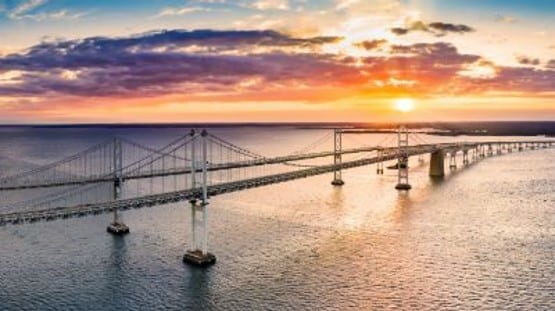
U.S. Rep. Abigail Spanberger, the only Virginian on the U.S. House Agriculture Committee, has long made clear that agriculture conservation practices are one of the most cost-effective solutions to address urgent problems.
Also a Ranking Member on the Committee’s Conservation, Research and Biotechnology Subcommittee, Spanberger is co-chair of the House Chesapeake Bay Task Force. She joined U.S. Sens. Tim Kaine of Virginia, Ben Cardin of Maryland, Bob Casey of Pennsylvania, Chris Van Hollen of Maryland and Mark Warner of Virginia, as well as U.S. Reps. Rob Wittman and Bobby Scott of Virginia and John Sarbanes of Maryland to introduce a legislative package aimed at reducing pollution within the Chesapeake Bay and its watershed.
The Chesapeake Bay Conservation and Acceleration Act would help Virginia farmers and producers contribute to the restoration and protection of the Chesapeake Bay Watershed —one-third of which is farmland. The legislation would support practices that focus on building healthy soils and maintaining permanent vegetation — so that the region’s farmers can help reduce pollution, remove carbon from the atmosphere, and improve the land’s ability to withstand floods, drought and other extreme conditions linked to climate change.
“The Chesapeake Bay is one of Virginia’s treasures — from its natural beauty to the economic opportunities and jobs it creates in our Commonwealth. As the only Virginian on the U.S. House Agriculture Committee, I’m proud to support this bipartisan bill to improve CREP, cut red tape for farmers wanting to deploy riparian buffers, and focus on strengthening the workforce tasked with protecting the Bay and its watershed,” Spanberger said. “I want to thank my colleagues in both parties for understanding the importance of restoring the Chesapeake Bay, helping our farmers be a part of the solution, and working together to protect this watershed for generations to come.”
Kaine said the Bay has a rich ecosystem and “is critical for our economy, supporting jobs in the tourism and seafood industries. I’m proud to introduce this bipartisan bill that implements smart agricultural conservation measures supported by farmers that will reduce pollution in the Chesapeake Bay and ensure the watershed is healthy for generations to come.”
The health of the Bay and regional agriculture are intertwined at the heart of the region’s cultural identity and economic wellbeing, according to Cardin.
“We have reason to be optimistic about the health of the Bay, but we must continue to do all we can to support our farmers so they can withstand and overcome the threats to their viability,” Cardin said.
Wittman said the agriculture industry is vital to the Bay’s economy and Virginia farmers are committed to protect the Bay.
“This legislation will ensure additional resources go directly to on-the-ground conservation projects that support farmers and restore the Chesapeake Bay. I’m proud to be leading this bipartisan effort to encourage the responsible stewardship of our lands, waters, and wildlife, and to fight for a cleaner, safer, and healthier Bay,” Wittman said.
The Chesapeake Bay, a national treasure, is “a regional economic engine that we all must fight to protect. This bill will help us do just that by boosting momentum for key Bay restoration priorities — from supporting our region’s farmers and their conservation efforts to restoring natural habitat to combatting invasive species that threaten native wildlife. These are key steps to preserving the Bay for generations to come,” Van Hollen said.
“Preserving the heath of the Chesapeake Bay is crucial to Virginia’s economy and our agriculture industry,” said Warner. “As we work together to restore the Bay that means so much to the region, I’m proud to introduce legislation that better supports farmers’ efforts to usher in safer, cleaner, and more cost-effective farming practices.”
The six Bay states and the District of Columbia are behind in meeting the pollution reductions required by the Chesapeake Clean Water Blueprint.
“With one-third of the Chesapeake Bay Watershed home to farmland, the health of our Bay and success of our agriculture industry are interconnected,” Sarbanes said. “I am proud to join this bipartisan, bicameral effort to equip farmers with the resources needed to improve conversation practices and help tackle the watershed’s most pressing source of pollution. The Chesapeake Bay Conservation Acceleration Act is one of my top priorities in this year’s Farm Bill, and I will work tirelessly alongside my colleagues to and get it across the finish line.”










